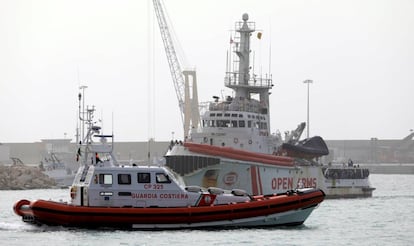Italy detains Spanish ship for rescuing refugees in Mediterranean
Proactiva Open Arms boat confiscated for promoting “illegal immigration” after saving more than 200 migrants


Italian authorities in Catania, Sicily have ordered the detention of the Spanish ship Open Arms for promoting “illegal immigration and criminal association,” according to sources from the not-for-profit organization. The order came after the vessel, run by the Catalan organization Proactiva Open Arms, rescued 218 migrants 70 miles off the coast of Libya. The ship has been confiscated as a preventive measure in the Italian port Pozzallo, the not-for-profit confirmed. Proactiva Open Arms is the only Spanish NGO that rescues migrants in the Mediterranean.
The public prosecutor in Catania has accused the organization of seeking to “bring migrants to Italy,” arguing it “violated the law and international agreements by not handing over the migrants to Libyan authorities.” The Italian police appeared on the ship on Sunday morning and demanded documentation from the captain, Marc Reig, and the head of the NGO’s mission, Anabel Montes. Both were “accompanied” that night to an Italian police station, according to a crew member from Open Arms.
Human rights groups have accused the Libyan coast guard of working with human traffickers
The founder of Proactiva Open Arms, Oscar Camps, confirmed on Monday that the ship is currently being held “under preventive detention” in the Sicilian port. According to Europa Press, Camps told Cataluyna Ràdio that he was surprised to be labeled as a criminal group and criticized the accusations from the public prosecutor. The founder said that Italian authorities had presented them with documentation for signature but they had refused to do so because the text was in Italian. “We decided not to sign the document until it was translated,” he explained.
The ship docked this Saturday in the Italian port after an encounter with Libyan coast guards during a rescue mission 73 miles from the coast of Libya – far outside Libya’s jurisdiction. Proactive Open Arms and journalists who took part in the voyage accused the Libyan coast guards of making threats and stopping the majority of the immigrants from reaching the Spanish vessel.
In a series of messages on Twitter, Camps explained that the ship had been detained on charges of “criminal association and encouraging illegal immigration by disobeying Libyans by not handing over women and children.” The founder of Proactiva Open Arms has defended the organization’s actions, stating that protecting human life should be the top priority of any body – civilian or military. Returning the migrants to the Libyan coast guards would be the “equivalent of a summary deportation,” which contravenes the UN Convention on the Status of Refugees, he added.
Proactiva Open Arms is the only Spanish NGO that rescues migrants in the Mediterranean
In a press release seen by Spanish news agency EFE on Saturday, the Libyan maritime authority accused the NGO and anyone who rescues migrants in Libya of interfering in their operations and violating their maritime borders – even though the operation took place 25 miles outside their jurisdiction. The Proactiva Open Arms ship was able to continue sailing with 218 migrants on board but was unable to bring them to land until this Saturday after Libyan authorities refused to give them access to a port in which to dock.
Human rights groups have accused the Libyan coast guard of working with human traffickers, claiming former smugglers are even leading the coast guard patrols. Meanwhile, migrants who arrive in Europe say that Libyan authorities send the people they rescue to detention centers and prisons in poor conditions where abuses are commonly committed.
In the last two years, the beaches between the Libyan capital Tripoli and the Tunisian border have become the main hot spot for human trafficking mafias – despite the presence of European patrols. According to data from the UN-associated International Organization of Migration, more than 171,635 irregular migrants arrived in Europe in 2017, while 3,116 died at sea. In just the first month of 2018, more than 2,900 have reached European shores while 318 have died in the attempt.
English version by Melissa Kitson.
Tu suscripción se está usando en otro dispositivo
¿Quieres añadir otro usuario a tu suscripción?
Si continúas leyendo en este dispositivo, no se podrá leer en el otro.
FlechaTu suscripción se está usando en otro dispositivo y solo puedes acceder a EL PAÍS desde un dispositivo a la vez.
Si quieres compartir tu cuenta, cambia tu suscripción a la modalidad Premium, así podrás añadir otro usuario. Cada uno accederá con su propia cuenta de email, lo que os permitirá personalizar vuestra experiencia en EL PAÍS.
¿Tienes una suscripción de empresa? Accede aquí para contratar más cuentas.
En el caso de no saber quién está usando tu cuenta, te recomendamos cambiar tu contraseña aquí.
Si decides continuar compartiendo tu cuenta, este mensaje se mostrará en tu dispositivo y en el de la otra persona que está usando tu cuenta de forma indefinida, afectando a tu experiencia de lectura. Puedes consultar aquí los términos y condiciones de la suscripción digital.








































